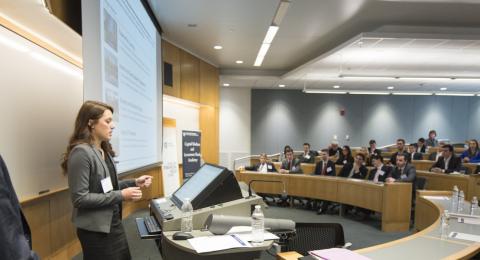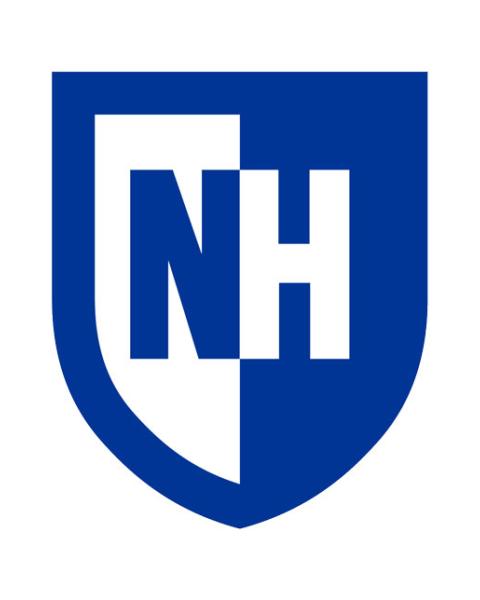Solve complex financial problems with a Master of Science in Finance. Whether you are looking to advance your career or break into a new area of business, you’ll be positioned to compete for some of the most lucrative and competitive jobs on the market. This program is perfect for those with undergraduate preparation in business, economics, or STEM fields, and is open to others after pre-requisite coursework.
Credit Hours: 30 | Courses: 10
Program Length: 9 Months Full-Time (Fall start) or 18 Months Full-Time (Spring start)
Why get a master’s degree in finance?
There is a critical need for finance professionals educated with the analytical, problem-solving, and ethical skills necessary to navigate their fields and lead their organizations. An M.S. in Finance is perfect if you who wish to build and deepen your foundation of financial knowledge and develop the highest level of skills in financial modeling, investment analysis, programming, and the communication of complex financial information. If you hold a bachelor’s degree from any major and have strong motivation and good quantitative skills, you can apply for the M.S. in Finance program.
Why choose UNH’s M.S. in finance program?
Specialized: Three tracks allow you to focus on financial analytics and fintech, investments, or design your own path.
STEM Designated: With a STEM-designated focus on mathematical finance, international students will graduate from the M.S. in finance program and be able to apply for a 24-month OPT STEM Extension to the 12-month Optional Practical Training Program (OPT) period, allowing you to work in the United States for up to 36 months after graduation with no additional visa requirement.
CFA Prep: The curriculum helps prepare you for the Chartered Financial Analyst (CFA) exam.
AACSB Accredited: AACSB is the hallmark of excellence in business education, a distinction earned by fewer than 6% of the world's business schools.
Flexible Program Structure: We offer a 9-month program with a fall start (fall, spring) and an18-month program with a spring start (spring, fall, spring). The fall start provides a faster track to the degree with a more intensive workload, while the spring start allows students to explore the finance field, extracurricular opportunities, and the job market at a more manageable pace.
Accelerated Option is available for eligible UNH undergraduates to start the program during the last year of undergraduate studies.
Potential career areas
- Financial analyst
- Hedge fund management
- Investment banking
- Personal financial advisor
- Risk management
- Securities, commodities, and finance services sales
- Wealth management
Curriculum & Requirements
The Master of Science in Finance, offered by the Peter T. Paul College of Business and Economics, develops students’ abilities to provide solutions to the increasingly diverse and complex financial challenges of modern organizations. The program can be completed in one year of full-time study by students with undergraduate preparation in business, economics, and/or STEM fields and is open to others after appropriate foundation coursework. Designed to develop the highest levels of skill in financial modeling, investment analysis, evaluation, problem-solving, and communication of complex financial information, the program offers specialized training in one of three non-mandatory options: investments, financial analytics & fintech, or a student-designed track. Students will also develop strong understanding of ethical considerations and professional standards necessary in the field of finance and will be well-prepared for a variety of roles including corporate finance, investment banking, and start-up enterprises.
All admitted candidates must have completed certain foundation courses. These courses can be completed prior to entry or as part of the Master of Science in Finance program. These courses include:
| Code | Title | Credits |
|---|---|---|
| ADMN 570 | Introduction to Financial Management | 4 |
| ECON 401 | Principles of Economics (Macro) | 4 |
| or ECON 402 | Principles of Economics (Micro) | |
| ADMN 510 | Business Analytics and Statistics | 4 |
| or MATH 425 | Calculus I | |
The Master's of Science in Finance (MSF) curriculum requires students to take a minimum of 10 classes (a total of 30 credits), from which 8 are required core classes and 2 are electives. Students may choose to specialize their MSF degree in the Financial Analytics & Fintech option or the Investments option by completing an additional elective in that specialized area for a total of 11 classes (33 credits).
| Code | Title | Credits |
|---|---|---|
| Core Coursework | ||
| ACFI 801 | Corporate Finance | 3 |
| ACFI 802 | Investments | 3 |
| ACFI 806 | Financial Modeling and Analytics | 3 |
| ACFI 870 | Programming in Finance with Quantitative Applications | 3 |
| ACFI 871 | Financial Theory | 3 |
| ACFI 872 | Corporate Financial Reporting | 3 |
| ACFI 873 | Cases in Finance | 3 |
| ACFI 874 | Finance Experience | 3 |
| Electives | ||
| Select 6-9 credits | 6-9 | |
| Total Credits | 30-33 | |
| Code | Title | Credits |
|---|---|---|
| Elective Options/Specialization Areas | ||
| Financial Analytics & Fintech Option | ||
| Select three courses from the following: | ||
| ACFI 810 | Big Data in Finance | 3 |
| ACFI 807 | Equity Analysis and Firm Valuation | 3 |
| ACFI 811 | Investment Banking | 3 |
| ACFI 896 | Topics (FinTech Venture) | 3 |
| Investments Option | ||
| Select three courses from the following: | ||
| ACFI 804 | Derivative Securities and Markets | 3 |
| ACFI 805 | Financial Institutions | 3 |
| ACFI 807 | Equity Analysis and Firm Valuation | 3 |
| ACFI 811 | Investment Banking | 3 |
| (or other approved electives in finance, decision sciences, economics, or statistics) | ||
Student-designed option electives
Students can design their own option and choose their electives after obtaining the consent and approval of the MSF Director or director's designee.
Non-option student electives
Students who prefer not to declare an option can choose any elective offered by the M.S. Finance program. However, without a study plan pre-approved by the MSF Director or director's designee, a student may only take one non-finance elective.
Accelerated Master's Overview
Accelerated Master’s programs offer qualified University of New Hampshire undergraduate students the opportunity to begin graduate coursework in select graduate programs while completing a bachelor’s degree. Accelerated master's programs are designed to provide students with an efficient and cost-effective pathway to earn both a bachelor's and master's degree or graduate certificate, enhancing career opportunities and long-term earning potential.
Accelerated Master's Highlights
- Begin studying advanced topics while an undergraduate student with the opportunity to complete a master’s degree or graduate certificate early.
- Master’s degree program students: Earn up to 12* graduate (800-level) course credits while completing a bachelor’s degree. This coursework will count as dual-credit toward both the bachelor’s and master’s degrees.
- Graduate certificate program students: Earn up to 8* graduate (800-level) course credits while completing a bachelor’s degree. This coursework will count as dual-credit toward both the bachelor’s degree and the graduate certificate.
- Students complete the bachelor’s degree, and then officially matriculate into the master’s or graduate certificate program to complete the remaining required graduate-level coursework.
*Some exceptions apply.
Accelerated Master's Admission Requirements
- A minimum 3.2 cumulative GPA is required.*
- A minimum of 90 undergraduate credits must be completed prior to enrolling in graduate (800-level) courses.
- Streamlined Graduate School Application (two letters of recommendation; most standardized tests and application fee are waived).*
*Some exceptions apply.
Accelerated Master's Requirements
- Students must attend a mandatory orientation session.
- Students must submit a special registration form each semester for dual-credit courses and note any DegreeWorks exceptions.
- Students may defer graduate matriculation for up to one year after earning their bachelor’s degree in most programs.
- See the Accelerated Master’s Catalog Policy and Accelerated Master’s Website for additional information and a list of programs. Note that some programs have additional requirements (e.g. higher-grade expectations) compared to the general policy.
Finance (M.S.) Accelerated Option
This graduate degree program is approved to be taken on an accelerated basis in articulation with the following undergraduate program(s):
| Code | Title | Credits |
|---|---|---|
| Business Administration: Finance (B.S.) | ||
| Students select from the following approved 800-level courses that can be completed in the undergraduate senior year for dual credit: | ||
| ACFI 801 | Corporate Finance | 3 |
| ACFI 802 | Investments | 3 |
| ACFI 804 | Derivative Securities and Markets | 3 |
| ACFI 806 | Financial Modeling and Analytics | 3 |
| ACFI 870 | Programming in Finance with Quantitative Applications | 3 |
| ACFI 872 | Corporate Financial Reporting | 3 |
Program Learning Outcomes
- Students will demonstrate knowledge of core content areas of finance.
- Students will demonstrate the ability to articulate advanced issues in finance and apply them in a business context.
- Students will demonstrate an understanding of the preparation and usage of financial statements.
- Students will demonstrate the ability to solve complex financial problems.
- Students will demonstrate an understanding of the ethical dimensions of decision making in a global business environment.
- Students will demonstrate effective oral and written communication skills in business decisions and environments.
- Students will demonstrate the ability to extract, cleanse and analyze financial data using statistical software or programming tools.
Deadline
Applications must be completed by the following deadlines in order to be reviewed for admission:
- Fall: June 1
- Spring: December 1 (Deadline extended to December 15 for Spring 2026)
- Summer: N/A
- Special: N/A
Application fee: $65
Campus: Durham
New England Regional: CT VT
Accelerated Masters: Yes (for more details see the accelerated masters information page)
New Hampshire Residents
Students claiming in-state residency must also submit a Proof of Residence Form. This form is not required to complete your application, but you will need to submit it after you are offered admission, or you will not be able to register for classes.
Transcripts
If you attended UNH or Granite State College (GSC) after September 1, 1991, and have indicated so on your online application, we will retrieve your transcript internally; this includes UNH-Durham, UNH-Manchester, UNH Non-Degree work and GSC.
If you did not attend UNH, or attended prior to September 1, 1991, then you must upload a copy (PDF) of your transcript in the application form. International transcripts must be translated into English.
If admitted, you must then request an official transcript be sent directly to our office from the Registrar's Office of each college/university attended. We accept transcripts both electronically and in hard copy:
- Electronic Transcripts: Please have your institution send the transcript directly to grad.school@unh.edu. Please note that we can only accept copies sent directly from the institution.
- Paper Transcripts: Please send hard copies of transcripts to: UNH Graduate School, Thompson Hall- 105 Main Street, Durham, NH 03824. You may request transcripts be sent to us directly from the institution or you may send them yourself as long as they remain sealed in the original university envelope.
Transcripts from all previous post-secondary institutions must be submitted and applicants must disclose any previous academic or disciplinary sanctions that resulted in their temporary or permanent separation from a previous post-secondary institution. If it is found that previous academic or disciplinary separations were not disclosed, applicants may face denial and admitted students may face dismissal from their academic program.
Letters of Recommendation: 2 Required
Recommendation letters submitted by relatives or friends, as well as letters older than one year, will not be accepted.
Students from UNH’s College of Engineering and Physical Sciences (CEPS) are eligible to waive one letter of recommendation. If you are a UNH CEPS applicant, please email Admissions Counselor Nathaniel Hunt at Nathaniel.Hunt@unh.edu for more information.
Test Scores: GMAT Optional
GMAT test scores are optional. Applicants may provide their GMAT or GRE scores to supplement their application or to be considered for department scholarships.
Please, request official test scores to be sent directly to the Graduate School by the testing service. Test scores more than five years old will not be accepted. Student copies and photo copies of scores are not considered official.
Personal Statement
- Please tell us about yourself and why you are interested in studying finance at the University of New Hampshire.
- Do you believe your college grades reflect your ability? Explain.
Resume
A current resume is required with your submitted application.
Important Notes
All applicants are encouraged to contact programs directly to discuss program-specific application questions.
Enrollment Deposit
This program requires an enrollment deposit of $500. If admitted the deposit will be due by the deadline specified in your admit letter. The enrollment deposit secures a seat in the program for an applicant and can be used towards tuition once the applicant starts the program. For more information please see our enrollment deposits help page.
International Applicants
Prospective international students are required to submit TOEFL, IELTS, or equivalent examination scores. English Language Exams may be waived if English is your first language. If you wish to request a waiver, then please visit our Test Scores webpage for more information.
Let Our Alumni Tell You Why the Paul MSF is a Great Choice
Conor Considine, MS Finance ’25, reflects on his positive experience as the first student to enroll in the Peter T. Paul College of Business and Economics’ Accelerated Master’s Program. Discover how this unique opportunity helped him fast-track his education and career goals.
Learn more about the Accelerated Master’s Program.
In order of appearance:
Michelle Burke, MSF '21 (Manager of Business Consulting: Finance at EY)
Abhi Mehda, MSF '21 (Treasury Analyst at Stonyfield)
Mike Finalborgo, MSF '22 (Financial Planning Associate at Vanguard)
Stefan Jelev, MSF '21 (Workplace Planning Consultant III at Fidelity Investments)
Vaishali Shroff, MSF '22 (Staff Accountant: Mergers & Acquisitions at Rarebreed Veterinary Partners)
Michael Brideau, MSF '20 (Research Analyst at DWS)
John Hornbeck MSF '22 (Financial Analyst at Wholesale Grocers)
Kavi Mehta, MSF '22 (Junior Staff Accountant at Infinite Computer Solutions)











